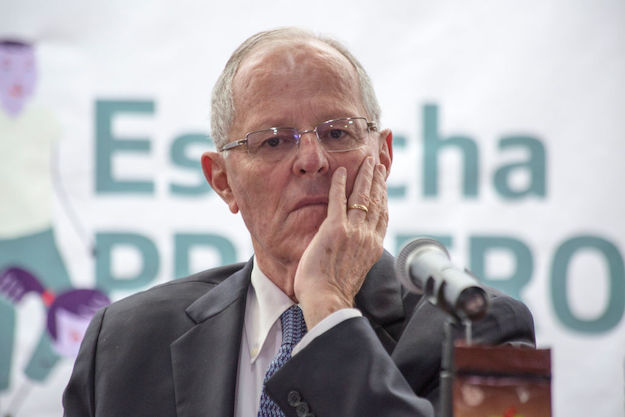Correction appended below
LIMA – Peruvian trust in democracy appears to be at rock bottom: a paltry 17 percent of the population believes their leadership governs “for the good of the whole population,” and just 45 percent say they support democracy as a system of governance.
Peruvians’ cynicism is not without good reason. Until recently, two former heads of state were in jail on corruption charges, while a third continues to fight extradition from the U.S. In December, President Pedro Pablo Kuczynski pardoned former President Alberto Fujimori, who was serving a 25 prison sentence, after himself only narrowly avoiding impeachment proceedings over his relationship with Brazilian construction giant Odebrecht.
Elected in part on promises to create a more equal and less corrupt country, Kuczynski has lost most of his credibility and legitimacy just 18 months into his term, and is now facing a fresh attempt at impeachment. But however justified the accusations against him, analysts say that Peruvian democracy’s problems run deeper than the current president’s alleged misdeeds, and fixing it will require more than changing the man at the top.
“The institutional design is full of problems,” said Fernando Tuesta, a political scientist who previously headed ONPE, the official agency that runs Peru’s elections.
Peru’s peculiar democratic framework – a presidential-parliamentary hybrid unique in Latin America – serves both to institutionalize conflict and prevent fresh voices with public backing from entering the political arena.
Kuczynski’s current plight is a case in point.
In 2016, Kuczynski was elected president with 50.12 percent of the second-round vote. But just 18 of his party members were elected to Congress. The fujimorista Popular Force party, by contrast, began the term with 73 of 130 seats in the single-chamber Congress, despite having earned just 36 percent of congressional votes. Popular Force benefitted from a redistribution system intended to provide stability but that in practice serves mostly to help traditional players swell their ranks.
Peru’s Congress also has extraordinary powers to keep the executive in check, including the ability to fire individual ministers and even the whole cabinet. As a result, Popular Force has been able to use its muscle in Congress to waylay Kuczynski’s agenda and hold him hostage to the threat of early retirement, even before he became embroiled in the Odebrecht scandal.
The corruption allegations have essentially put Kuczynski’s presidency on hold, with an approval rating of 15 percent and new impeachment proceedings underway.
Deeply unpopular though Kuczynski is, he is hardly an outlier in recent Peruvian history, where presidents’ images have often been defined by allegations of venality, ineptitude and the flouting of campaign promises once in office. His two immediate predecessors, Ollanta Humala and Alan García, both spent significant chunks of their presidencies with approval ratings in the 20s, while Alejandro Toledo even dropped into single digits. Congress, for its part, is not far behind Kuczynski, with just 16 percent approval.
No surprise then that an overwhelming number of Peruvians say they would rather vote for new parties in the next elections. Yet they are unlikely to get the chance thanks to a law approved by Popular Force legislators and others that requires the signatures of 4 percent of the electorate, roughly 700,000 voters, for a party to register. Tuesta describes that as “absurd,” and others view it as an arbitrary bar to democratic participation.
That spells trouble for promising young candidates, such as the leftist Verónika Mendoza and the centrist Julio Guzmán, both of whom ran in the 2016 elections for the first time. The former narrowly missed out on the runoff vote and the latter was controversially disqualified on a technicality just as he took the lead in polls. Both have since fallen prey to internecine feuding and are now trying to launch new parties. Experts suspect the pair will end up reaching a classic Peruvian solution, reluctantly agreeing to be the 2021 presidential candidates of small, existing parties with which they may have a limited ideological affinity.
This alternative points to another problematic idiosyncrasy of Peru’s democracy. The country already has 22 registered parties, a high number that limits the chances of a clear national discussion about broader policy alternatives and leaves most parties as weak and ephemeral vehicles for the personalist campaigns of their presidential candidates. That includes Kuczynski, whose Peruvians for Change (Peruanos Por el Kambio) party is based on his initials.
“It is lethal for democracy,” says Heber Joel Campos, an expert in constitutional law at the Pontifical Catholic University of Lima. “Party platforms become indistinguishable and the public debate revolves around specific, immediate issues.”
Other structural problems include the fact that, under the 1992 constitution – ushered in by Fujimori after his auto-golpe, in which the then-president shuttered a recalcitrant legislature – Peru’s Congress has just a single chamber. Many here have long argued that the return of the Senate would provide an important check on the potential excesses of the lower house, with the recent impeachment attempt a good example.
Although there have been numerous proposed electoral reforms, including from ONPE, Congress has repeatedly ignored them, with existing lawmakers apparently fearful of losing power and privileges. That means that Peru’s crisis of democratic representation, and governability, is unlikely to end any time soon.
“There has really not been a moment since 2000 when Peruvian democracy has not been at risk,” said Tuesta. “But how long can it last?”
This article has been corrected to clarify the length of former President Alberto Fujimori’s prison sentence
—
Tegel is a journalist based in Lima








